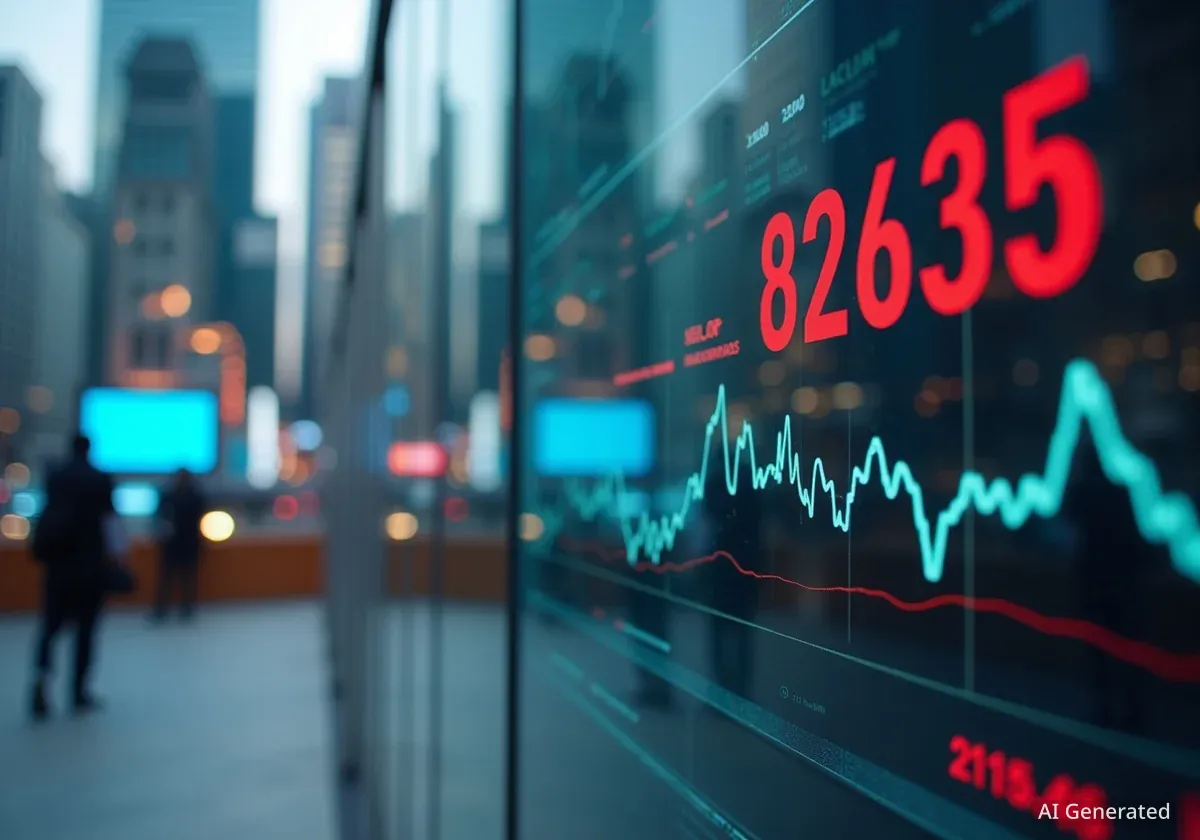Recent surges in the stock values of AI-related companies, such as Oracle's 36 percent single-day jump following a deal with OpenAI, have intensified discussions about a potential market bubble. This rapid growth has prompted analysts to evaluate the potential consequences for the commercial real estate sector, drawing parallels to the dot-com crash of the early 2000s.
While some experts see warning signs in current market valuations, others argue that the fundamental value and rapid integration of AI technology create a different economic landscape. The debate centers on whether the current investment frenzy is sustainable and what a market correction could mean for property sectors, particularly data centers and office spaces.
Key Takeaways
- Market analysts are debating whether the rapid rise in AI company valuations constitutes an economic bubble.
- The data center market is considered the real estate sector with the most direct exposure to the AI boom.
- A potential AI market downturn could have broader economic consequences, including impacts on household wealth and investment, affecting all property types.
- Experts compare the current situation to the dot-com era, noting key differences such as widespread remote work and the faster integration of AI into mature industries.
Market Valuations Raise Concerns
The conversation around a potential AI bubble gained momentum after significant market events. Oracle's stock, for example, added $244 billion in market capitalization in a single day, fueling speculation. This has led to a closer examination of overall market health.
Michael Acton, head of research for North America at AEW Capital Management, pointed out a concerning metric. He noted that Warren Buffet's preferred measure of equity market risk, the ratio of market capitalization to GDP, is at an all-time high. According to Acton, this ratio is significantly higher now than it was during the tech crash of the early 2000s, which gives market watchers pause.
This period of high valuation is occurring as many advanced economies face slowing population and labor force growth. Acton suggests that future economic expansion will heavily rely on productivity gains from technology like AI. If these productivity gains do not materialize as expected, the economic fallout could be substantial.
Data Centers at the Forefront
The most direct link between the AI boom and commercial real estate is the demand for data centers. These large, power-intensive facilities are essential for training and running the complex models that underpin artificial intelligence.
"The manifestation of AI in commercial real estate is in data centers. Data centers are tremendously large, and they require huge amounts of power to drive the chips that run the large language models (LLMs)."
Timothy H. Savage, a professor at the NYU Schack Institute of Real Estate, explained that the potential for a bubble lies not just in AI stocks but in the physical infrastructure supporting them. He cautioned that a technological shift could render current data center designs obsolete. If algorithms evolve to be processed in parallel rather than serially, the need for massive, centralized facilities could shrink, potentially devaluing these assets.
Data Center Construction Boom
According to data from CoStar Group, 282 data centers have been delivered or are under construction since 2020. Of these, 79 exceed 500,000 square feet, a scale far beyond what was seen during the dot-com era.
Chad Littell of CoStar Group highlighted the massive scale of current development. The geographic distribution is also wider than in previous tech booms, with major projects in Virginia, Georgia, Arizona, and Texas. This suggests that if a downturn were to occur, its impact would be spread across many regions rather than concentrated in one area like Silicon Valley.
Echoes of the Dot-Com Crash
Many analysts are looking to the dot-com bubble of the late 1990s for lessons. That period saw the NASDAQ index lose over 70% of its value between March 2000 and October 2002. However, experts note crucial differences between then and now.
Ryan Severino, chief economist at BGO, argued that bubbles, while painful in the short term, can signal important long-term economic shifts. "Such was the case with the dot-com bubble of the late 1990s. And such could be the case again," he stated, suggesting that AI will fundamentally change the economy much like the internet did.
Differing Impact on Office Space
The effect on the office market is one area where the comparison diverges significantly. After the dot-com crash, office vacancy rates in tech hubs like San Francisco and Boston skyrocketed. Littell noted that San Francisco's vacancy rate jumped from 1.3% in 2000 to 15.5% by 2003.
Today, the office market is already in a correction phase due to the rise of remote work. John Chang of Marcus & Millichap estimates that 50% to 67% of tech employees now work remotely, compared to a single-digit percentage in 2000. "That lessens the risk a breached bubble would pose to the already battered office sector," Chang said.
A Structurally Different Economy
Unlike the speculative nature of many dot-com companies, AI technology is being integrated into existing, mature industries more quickly. This broad adoption could provide more stability and value, potentially making the AI sector less vulnerable to a complete collapse compared to the dot-com era's many companies with no clear path to profitability.
Furthermore, the AI workforce is more geographically dispersed. While the Bay Area remains a key hub, AI talent is spread across numerous cities. This distribution would likely dilute the impact of a potential downturn on any single real estate market.
Broader Economic Risks and Investor Outlook
Some analysts warn that a potential AI bubble collapse could trigger a wider economic crisis. Christopher Thornberg, a founding partner at Beacon Economics, expressed concern that the AI investment frenzy is occurring alongside massive federal government borrowing.
Thornberg argued that foreign investment chasing high AI returns has helped keep U.S. interest rates manageable. "When the bubble collapses, the U.S. will be forced to self-fund the Federal deficit, leading to a sharp rise in interest rates," he warned. This could create a public debt crisis, a scenario he believes every commercial real estate investor should fear.
For property investors, a major stock market downturn could also trigger a "negative denominator effect," as described by Michael Acton. This occurs when falling stock values in a portfolio force investors to sell other assets, like real estate, to maintain their target allocation percentages.
Despite the risks, many believe the long-term outlook for AI remains strong. Ryan Severino advises investors to focus on the structural changes AI will bring rather than fixating on a potential bubble. He concluded, "Long-term AI-related prospects look transformative, and investors who focus on that should, ultimately, fare well once again."





